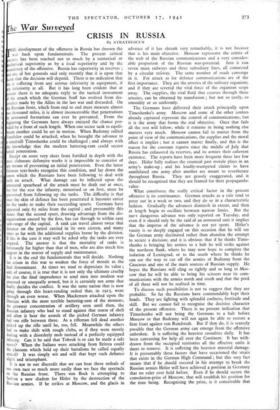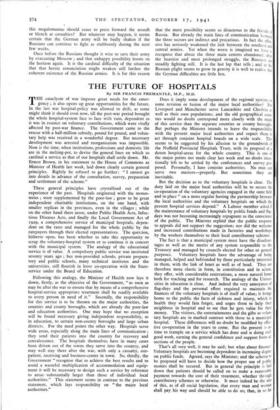The War Sur veyed
CRISIS IN RUSSIA
By STRATEGIC CS
HE development of the offensive in Russia has thrown the war back upon fundamentals. The present critical cture has been reached not so much by a numerical or echanical superiority as by a local superiority and by the ndancy of the offensive. Russia has superiority in reserves ; d one of her generals said only recently that it is upon that ctor that the decision will depend. There is no indication that e is suffering from any serious inferiority in equipment, if y inferiority at all. But it has long been evident that at resent there is no adequate reply to the tactical instrument the attack which the German Staff has evolved from dis- overies made by the Allies in the last war and discarded. On e Russian front, which from end to end must measure almost o thousand miles, it is almost inconceivable that penetrations y armoured formations can ever be prevented. From the inning the- Germans have always enjoyed the chance pro- 'tied by a front of such length. When one sector sank to equili- 'urn another could be set in motion. When Budenny rallied 'orishilov could be attacked, when he brought the advance to standstill Timoshenko could be challenged ; and always with the knowledge that the modern battering-ram could secure initial penetration.
Except on some very short front fortified in depth with the most elaborate defensive works it is impossible to conceive of any means of preventing an initial penetration. Even the latest German text-books recognise this condition, and lay down the canon which the Russians have been following to deal with such an attack. What damage can be inflicted upon the armoured spearhead of the attack must be dealt out at once, but for the rest the infantry, motorised or on foot, must be prevented from following up the tanks. The difficulty is that once the skin of defence has been penetrated it becomes easier for the tanks to make their succeeding spurts. Germans have appeared only 65 miles from the capital ; and presumably this means that the second spurt, drawing advantage from the dis- organisation caused by the first, has cut through to within easy tank-range of the capital. A tank can travel almost twice that distance on the petrol carried in its own cistern, and many times as far with the additional supplies borne by the division. If this is the case it may well be asked why the tanks are ever stopped. The answer is that the mortality of tanks is fortunately far higher than that of men, who are also much less exigent in the matter of supply and maintenance.
It is in the end the fundamentals that will decide. Nothing has arisen in this war to weaken the force of morale as the final determinant. At times we tend to depreciate its value ; and, of course, it is true that it. is not only the ultimate cruelty but also the final imprudence to send men into modern war unarmed or unequally armed, but it is certainly not arms that finally decides the conflict. It was the same nation that is now going through this heart-rending ordeal that, in 1915, went through an even worse. When Mackensen attacked upon the Dunajec with the most terrible battering-ram of the moment, the greatest concentration of artillery seen until then, the Russian infantry who had to stand against that storm of shell and after it bear the assault of the picked German infantry had one rifle between three. As a rifleman fell dead another picked up the rifle until he, too, fell. Meanwhile the others had to make shift with rough clubs, as if they were merely dealing with a disorderly mob instead of a perfectly equipped Infantry. Can it be said that Tobruk is or can be made a safe resort? When the Italians were attacking from Eritrea could the platoons which held up their battalions be called equally armed? It was simply wit and will that kept such defiance alight and triumphant.
It is not to our discredit that we can bear these ordeals of our own race so much more easily than we face the spectacle On the Russian front. There von Bock is attempting to fashion a new diadem for Hitler by the destruction of the Russian armies. If he strikes at Moscow, and the glacis in advance of it has shrunk very remarkably, it is not because that is his main objective. Moscow represents the centre of the web of the Russian communications and a very consider- able proportion of the Russian war-potential. Into it run seven main railways and three subsidiary lines, all connected by a circular railway. The same number of roads converge in it. For attack as for defence communications are of the first importance. They are the arteries of the military organism; and if they are severed the vital force of the organism seeps away. The supplies, the vital fluid that courses through these arteries, can be obtained by transfusion ; but not so easily, so smoothly or so uniformly.
The Germans have delivered their attack principally upon Timoshenko's army. Moscow and some of the other centres already captured represent the control of communications; but it is the army that forms the real objective. Once that fails all the rest will follow; while it remains in being nothing else matters very much. Moscow cannot fail to matter from the point of view of the communications, the supplies and the moral effect it implies ; but it cannot matter finally, and this is the reason for the constant reports since the middle of July that Russia has exhausted its reserves, and its armies their coherent existence. The reports have been more frequent these last few days. Hitler fully realises the essential part morale plays in an army's make-up ; and his loudly-trumpeted claims to have annihilated one army after another are meant to reverberate throughout Russia. They are grossly exaggerated, and it should be recognised that they are framed for their propaganda- value.
What constitutes the really critical factor in the present offensive is its continuance. German attacks as a rule tend to peter out in a week or two, and they do so in a characteristic fashion. Gradually the advances diminish in extent, and then at length begin to oscillate between narrow limits. But the moat dangerous advance was only reported on Tuesday, and even if it should only be the raid of an armoured unit it implies that the impetus of the advance is not yet spent. Hitler's vanity is so deeply engaged on this occasion that he will see the German army decimated rather than abandon the attempt to secure a decision; and it is obvious that if he thinks Timo- shenko is bringing his armies to a halt he will strike against the northern flank, where he may now hope to complete the isolation of Leningrad, or to the south where he thinks he can see the way to cut off the armies of Budenny from the Caucasus and one of the main sources of Russian supply. He hopes the Russians will cling so tightly and so long to Mos- cow that he will be able to bring his scissors near its com- munications with the armies north and south and that the peril of all three will not be realised in time.
To discuss such possibilities is not to suggest that they are probable. So far the Russians have commendably kept their heads. They are fighting with splendid coolness, fortitude and skill. But we cannot fail to recognise the decisive character of the present offensive. There is no present indication that Timoshenko will not bring the Germans to a halt before Moscow or that Budenny will not again be able to restore a firm front against von Rundstedt. But if they do, it is scarcely possible that the German army can emerge from the offensive unbroken. It is suffering the heaviest casualties daily. It has been canvassing for help all over the Continent. It has with- drawn from the occupied territories all the effective units it dares to remove. It is suffering the heaviest material damage. It is presumably these factors that have occasioned the strain that exists in the German High Command ; but this very fact means that if he should succeed in his attempt to break the Russian armies Hitler will have achieved a position in Germany that no ruler ever held before. Even if he should secure the consolation-prize of Moscow, that will establish his position for the time being. Recognising the prize, is it conceivable that this megalomaniac should cease to press forward the assault or blench at casualties? But whatever may happen, it seems certain that the German army will be badly shaken if the Russians can continue to fight as stubbornly during the next few weeks.
Once before the Russians thought it wise to save their army by evacuating Moscow ; and that unhappy possibility looms on the horizon again. It is the cardinal difficulty of the situation that that heroic renunciation might weaken still farther the coherent existence of the Russian armies. It is for this reason that the mere possibility seems so disastrous to the friends of Russia. But already the main lines of communication between the three sectors are indirect and precarious. In fact the offen- sive has seriously weakened-the link between the southern aild central armies. Yet when the worst is imagined we have to recognise that about the three main centres abandoned, after the heaviest and most prolonged struggle, the Russians are steadily fighting still. It is the last lap that tells ; and as the Russian plight seems to grow in gravity it is well to realise that the German difficulties are little less.



























 Previous page
Previous page